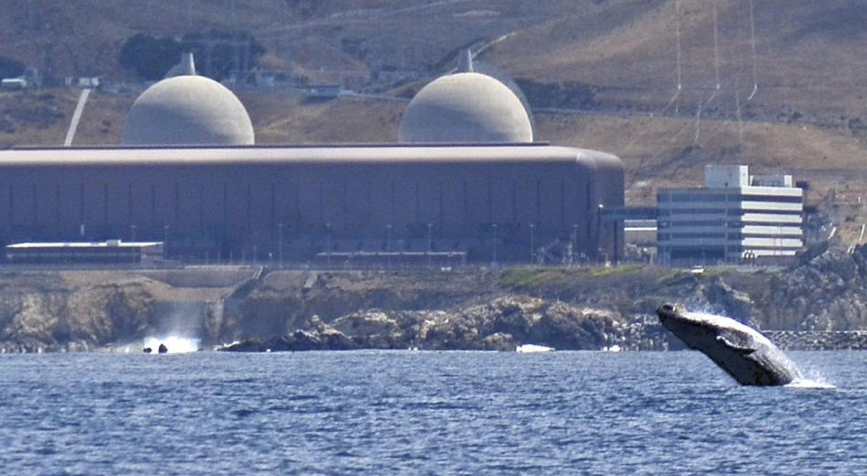CommentsENERGY POLITICS-Powerful forces are quickly moving Pacific Gas & Electric towards a settlement on its hideously complex multi-billion-dollar bankruptcy case. Thankfully, Gov. Gavin Newsom has put at least a temporary hold on a final agreement.
But in the interim, it must be brought to light that no squaring of PG&E’s accounts -- with the people of California, the utility’s fire victims, the governor, the Public Utilities Commission, the banks or the planet -- will be complete unless there is a transparent, public inspection of, and credible mechanical and fiscal accounting for, Diablo Canyon’s two aging reactors. (photo above) (See our petition at Solartopia.org.)
The two central coast nukes are scheduled to shut by 2025, a fact that gives some policy makers a false sense of safety and convenient cover to avoid thinking about the devastating possibility of an earthquake that would render a major population center uninhabitable and its agricultural economy barren. Why kick up a fuss if the problem’s going away in five years?
Here’s why: the same pattern of lethal neglect and deferred maintenance that made PG&E the proven culprit in murderous wildfires is repeated at Diablo Canyon. But nuclear reactor units are more than thirty years old. Diablo Unit One was long ago found to be seriously embrittled, which means its piping is almost certainly cracked due to age. Its list of deferred maintenance procedures is a by-now notorious PG&E trademark. Its waste management procedures are suspect. The site is surrounded by more than a dozen interlinked earthquake faults.
Can we really trust the operation of these immensely complex machines over the coming sixty months to a company we don’t trust to safely deliver electricity in a light breeze?
We don’t need to; the power Diablo generates can be made up by truly renewable energy sources.
Now is the time -- before PG&E’s bankruptcy is resolved -- for the governor, the California Public Utilities’ Commission, and other public authorities to conduct a transparent inspection of PG&E’s nuclear facility at Diablo. A truthful appraisal of the reactors -- what PG&E might claim as its biggest single asset -- is impossible without a thorough inventory of the reactor’s structural liabilities.
Technically, such inspections are the bailiwick of the Nuclear Regulatory Commission. The NRC is currently a captive agency, with three of its five Commissioners appointed by Trump. They have advocated a drastic scale-back of on-site safety inspections, allowing the nation’s 96 aging reactors to become progressively more dangerous to our population.
But PG&E’s bankruptcy creates a condition outside the NRC’s purview: the court must ensure that the aggrieved parties are given a full understanding of the financial value and risks of the assets at stake.
All U.S. reactors, Diablo among them, lack private insurance. A federal fund to which providers contribute, to cover their liability for catastrophic accidents, contains less than $13 billion, a drop in the bucket compared to what even one such accident would cost.
And who will run these two hotly contested nukes after the bankruptcy settlement? Public ownership is being hailed as a possible, progressive solution; does that mean We the People unwittingly assume liability for the incalculable health, ecological and property damages If the San Andreas (or any other) fault reduces Diablo to radioactive rubble and creates an apocalypse throughout the central valley, down to Los Angeles, up to the Bay Area, and into northern California so recently reduced to ash by PG&E?
The high-stakes debate over what to do with what was once the world’s largest electric utility has been suspiciously silent on Diablo’s two 800-pound gorillas. So hear this scream: the question of ownership -- private or public -- cannot be answered without accounting for the structural safety and potential liabilities of the two decrepit megaliths at San Luis Obispo.
The governor, the CPUC, the courts and the company must provide the public with a detailed, independent and credible look at the innards of these two immense machines before any bankruptcy proceedings can conclude or any future for California’s electric supply can be mapped out. Call them all now!
(Mimi Kennedy is an actress and activist on the Board of Progressive Democrats of America. Harvey Wasserman is an LA-based talk radio host and author of “The People’s Spiral of U.S. History.” (solartopia.org). Prepped for CityWatch by Linda Abrams.
















